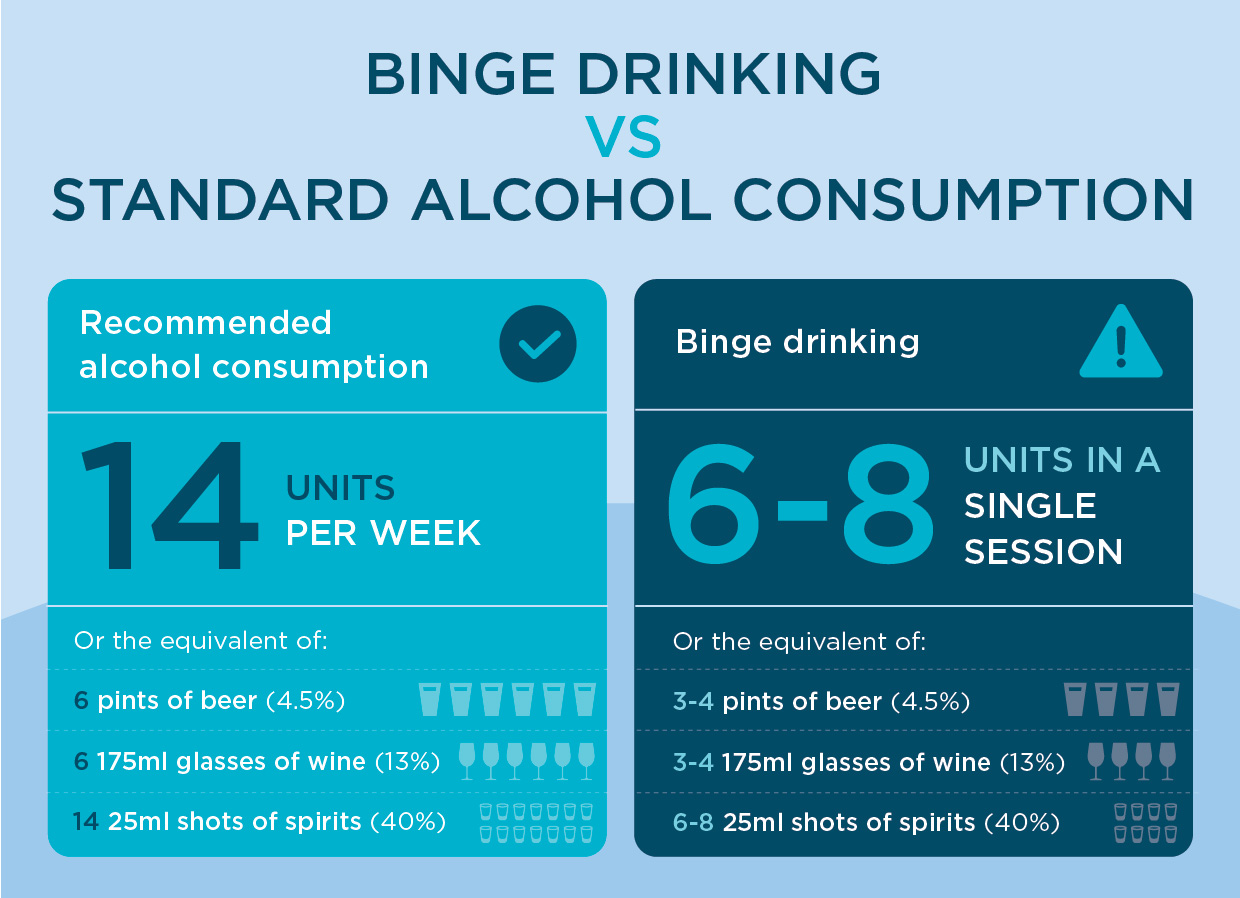Binge drinking: what it is, the effects and how to stop
Every journey begins with a single step. Call us and let's talk about how we can support you on your path to recovery.
Every journey begins with a single step. Call us and let's talk about how we can support you on your path to recovery.



Heavy sessions of drinking are sometimes called a ‘binge’. In this article, we outline how much alcohol is classed as a binge, the effects it can have, and what you can do to stay safe when drinking alcohol.
According to the NHS, binge drinking is when you “drink heavily over a short period of time.” This can happen when you drink with the intention of getting drunk – which will typically result in you drinking a lot of alcohol quickly.
But how much alcohol should be considered binge drinking? The UK government’s alcohol strategy suggests that anything exceeding six units of alcohol for women and eight units for men in a single day is classed as binge drinking. This is roughly equivalent to:

Alcohol statistics show that, in England, over a quarter of men (28.7%) and women (25.6%) binged alcohol on their heaviest drinking day of that year.
People binge drink alcohol for a multitude of reasons, with some common causes being:
People use binge drinking as an unhealthy coping strategy to try and manage their negative emotions. However, alcohol use only ever numbs or mutes these emotions in the short term, rather than helping the person to effectively deal with the root cause of these feelings.
There is no definitive answer as to whether someone’s binge drinking can be classed as alcoholism, but if someone is binge drinking regularly and displaying symptoms of alcohol addiction, then it could indicate a dependency.
Some of those key symptoms might be:
The negative effects of alcohol are well documented. Drinking heavily can have an impact on your physical and mental health in both the short and long-term.
After binge drinking, you're more at risk of a range of physical issues. You might experience things like poor vision, an inability to concentrate, or reduced reaction times. You can also suffer from blackouts. These are periods of short-term memory loss, where you wake up the next day and can’t remember what happened the night before.
Binge drinking also leaves you at risk of alcohol poisoning, which can have a wide range of damaging effects on your physical health. Your mental health can also be affected in the short-term. As a depressant, alcohol can lower your mood and make negative emotions worse. Drinking can lead to hangxiety, which is mix of a hangover and anxiety.
Consistent binge drinking over a long period of time can lead to a variety of issues with your physical health. It may increase your risk of liver damage, various types of cancer, high blood pressure and even brain damage.
Mentally, alcohol can have a lasting impact too. For example, the connection between alcohol and depression is well established. It leaves around 60% of people in alcohol treatment also needing mental health treatment.
We know how hard it can be to reduce your alcohol consumption, but with a clear plan and some effective strategies, you can cut down on how much you drink. Here are just a few things you could introduce next time you think you could be heading for a binge drinking session:
If you’re worried about your drinking habits, book an appointment with your GP. While the idea of talking to someone about your binge drinking may be scary and even embarrassing, it’s an important step to take.
Your GP will be there to support you. They'll be able to provide you with advice on how to stop binge drinking and cut down on your alcohol consumption. They may also be able to recommend support groups.
If you’re looking to stop binge drinking, it’s important to know that you’re not alone in your journey. You might be surprised at how many people near you are having similar struggles. Many people find it helpful to share their stories and listen to others who are struggling.
You could look for a support group in your area, such as Alcoholics Anonymous (AA), where you can share your experiences, gain strength from others and receive ongoing support from your peers.
If your drinking is negatively affecting you and those around you, then it’s important that you consider reaching out for specialist treatment for addiction. Due to the many effective treatments available for people battling alcohol dependency, it’s possible for you to make significant strides in your recovery. With the right level of support, you can regain control of your life.
Common treatments include:
Priory offers a free addiction assessment at one of our treatment centres within our nationwide network. This assessment gives our team an opportunity to find out more about your circumstances and the severity of your drinking so they can recommend the most effective form of treatment for you.
At Priory, our treatment programmes for people with alcohol issues can take place in the form of residential treatment, day care packages or outpatient treatment. Each type of treatment will be delivered by an expert team of therapists, psychiatrists, psychologists and other compassionate experts.
With access to the correct treatment, you have the opportunity to recognise the reasons for your binge drinking and work towards a new phase of your life.
